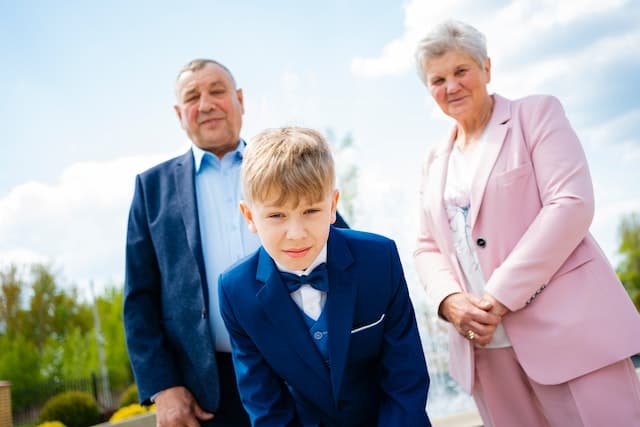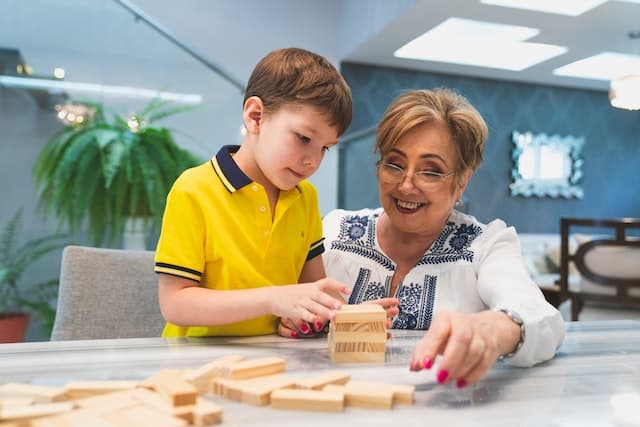Children misbehave for various reasons, and it is a common occurrence that parents and caregivers need to address.
Misbehavior could range from minor infractions such as talking back to more severe ones like physical aggression. It is essential to understand the different types of consequences that can be used to discipline children who misbehave.
One type of consequence is natural consequences, where the child experiences the outcome of their actions. For example, if a child refuses to wear a coat on a cold day, they will feel cold and learn to wear their coat in the future.
Another type is logical consequences, where the consequence is directly related to the misbehavior. For instance, if a child refuses to clean up their toys, they may lose the privilege of playing with them.
It is crucial to note that consequences should not be punitive or harmful to the child. Instead, they should be used to teach the child about the impact of their behavior and how to make better choices in the future.
By using appropriate consequences, parents and caregivers can help children learn from their mistakes and grow into responsible adults.
Key Takeaways
- Natural and logical consequences are effective ways to discipline children who misbehave.
- Consequences should be used to teach children about the impact of their behavior and how to make better choices in the future.
- Punitive or harmful consequences should be avoided.
Understanding Misbehavior
Misbehavior is a common occurrence in children, and it can take many forms, including tantrums, negative behavior, and lack of focus. Understanding what causes misbehavior is crucial to addressing it effectively.
Children misbehave for various reasons, including seeking attention, testing boundaries, and expressing emotions. Misbehavior can also result from frustration, boredom, or lack of knowledge of what is expected of them.
It is essential to recognize that misbehavior is a normal part of child development and that children often lack the skills and emotional regulation necessary to manage their behavior effectively.
Parents and caregivers can help children learn these skills by providing consistent and appropriate consequences for misbehavior.
Consequences for misbehavior can take several forms, including positive reinforcement, negative consequences, and natural consequences. Positive reinforcement involves rewarding good behavior, while negative consequences involve consequences for negative behavior.
Natural consequences occur when a child experiences the consequences of their actions without intervention from a parent or caregiver.
It is essential to choose consequences that are appropriate for the child’s age and developmental stage and that are consistent with the behavior being addressed. Consistency is key to addressing misbehavior effectively, as children need clear and consistent boundaries to learn appropriate behavior.
In conclusion, understanding misbehavior is crucial to addressing it effectively. Children misbehave for various reasons, and consequences for misbehavior can take several forms.
By providing consistent and appropriate consequences for misbehavior, parents and caregivers can help children learn the skills and emotional regulation necessary to manage their behavior effectively.
Types of Consequences
When children misbehave, it is important to provide consequences that help them learn from their mistakes and encourage them to behave appropriately in the future. There are several types of consequences that can be used to achieve this goal.
Natural Consequences
Natural consequences occur when children experience the direct result of their actions. For example, if a child refuses to wear a coat on a cold day, they will feel cold.
This consequence is natural because it occurs as a direct result of the child’s actions. Natural consequences can be effective in teaching children about cause and effect.
Logical Consequences
Logical consequences are consequences that are related to the misbehavior in a logical way. For example, if a child refuses to clean up their toys, they may lose the privilege of playing with those toys for a period of time.
This consequence is logical because it is directly related to the misbehavior. Logical consequences can be effective in teaching children about responsibility and accountability.
Negative Consequences
Negative consequences involve taking something away from the child as a result of their misbehavior. For example, if a child hits their sibling, they may lose the privilege of watching TV for the rest of the day. Negative consequences can be effective in teaching children about the negative consequences of their actions.
Positive Consequences
Positive consequences involve rewarding the child for appropriate behavior. For example, if a child completes their homework without being reminded, they may earn extra screen time. Positive consequences can be effective in encouraging children to behave appropriately.
Imposed Consequences
Imposed consequences are consequences that are imposed by an authority figure, such as a parent or teacher.
For example, if a child is caught cheating on a test, they may receive a detention. Imposed consequences can be effective in teaching children about the consequences of breaking rules and the importance of following rules.
Overall, it is important to choose consequences that are appropriate for the misbehavior and that help children learn from their mistakes. By using a variety of consequences, parents and teachers can help children develop responsible and respectful behavior.
Discipline Strategies
Discipline is an essential part of raising children, and it helps to provide them with a sense of structure and boundaries.
Different discipline strategies can be used to help children understand what is expected of them and to learn from their mistakes. Here are some common discipline strategies that can be used when children misbehave.
Time-Out
Time-out is a discipline strategy that involves removing a child from a situation and placing them in a designated area for a specific period.
The idea is to remove the child from the situation and give them time to calm down and reflect on their behavior. Time-out can be an effective strategy for children who are acting out or being disruptive.
Positive Punishment
Positive punishment involves adding something unpleasant after a child has misbehaved. For example, if a child refuses to clean their room, a positive punishment might be to take away their favorite toy. The goal is to discourage the behavior and encourage the child to comply with the rules.
Negative Punishment
Negative punishment involves taking away something pleasant after a child has misbehaved. For example, if a child is not following the rules, negative punishment might be to take away their TV privileges. The goal is to encourage the child to comply with the rules and discourage the behavior.
Repetition
Repetition is a discipline strategy that involves repeating the same message or instruction until the child complies. For example, if a child is not listening, a parent might repeat the instruction until the child follows through. The goal is to reinforce the message and encourage the child to comply.
Ignoring
Ignoring is a discipline strategy that involves ignoring the child’s behavior when they are seeking attention. The idea is to not reinforce the behavior and to encourage the child to seek positive attention instead.
Distraction
Distraction is a discipline strategy that involves redirecting the child’s attention to something else. For example, if a child is throwing a tantrum, a parent might distract them with a toy or game. The goal is to redirect the child’s attention and calm them down.
In conclusion, discipline strategies can be used to help children understand what is expected of them and to learn from their mistakes.
Different strategies can be used depending on the situation and the child’s behavior. It is important to remain consistent and to use strategies that are appropriate for the child’s age and development.
Role of Rewards and Reinforcements
Rewards and reinforcements are essential tools for parents and caregivers to encourage positive behavior in children. They can be used to reinforce good behavior and discourage negative behavior. Rewards can take many forms, including praise, privileges, and tangible items such as toys or treats.
Positive reinforcement is a powerful tool for encouraging good behavior. This type of reinforcement involves rewarding the child for behavior that is desirable. For example, a child who completes their homework on time may be rewarded with extra screen time or a special treat.
Positive reinforcement can be a powerful motivator for children, as it helps them associate good behavior with positive outcomes.
Praise is another form of positive reinforcement that can be very effective. When a child does something well, parents and caregivers can offer verbal praise to encourage them to continue the behavior.
For example, if a child shares their toys with a friend, the parent might say, “Great job sharing your toys! That was very kind of you.” Praise can be a powerful motivator for children, as it helps them feel good about themselves and their actions.
Negative reinforcement can also be used to discourage negative behavior. This type of reinforcement involves taking away something the child wants in response to negative behavior. For example, if a child throws a tantrum in a store, the parent might take away a toy they were planning to buy.
Negative reinforcement can be effective in discouraging negative behavior, but it should be used sparingly and only when necessary.
In conclusion, rewards and reinforcements are important tools for promoting positive behavior in children. Positive reinforcement, such as praise and rewards, can be very effective in encouraging good behavior.
Negative reinforcement can also be useful in discouraging negative behavior, but it should be used sparingly. Parents and caregivers should use rewards and reinforcements consistently and fairly to promote positive behavior in their children.
Parenting and Control
Parenting is a complex and challenging task that requires a balance of love, support, and discipline. One of the key aspects of parenting is control, which involves setting boundaries and rules for children to follow.
When children misbehave, it is important for parents to respond with appropriate consequences that help them learn from their mistakes and develop self-control.
Effective parenting involves a combination of positive reinforcement and discipline. Parents should praise and reward good behavior, while also setting clear expectations and consequences for misbehavior.
This helps children understand what is expected of them and the consequences of their actions.
Control is an important aspect of parenting, but it is important to use it in a positive and constructive way. Yelling, screaming, or using physical punishment can be harmful to children and can lead to negative outcomes.
Instead, parents should use positive reinforcement, such as praise and rewards, to encourage good behavior and self-control.
Setting boundaries is also important in helping children develop self-control. Parents should set clear rules and expectations for their children, and enforce them consistently.
This helps children understand what is expected of them and what consequences they will face if they misbehave.
In summary, effective parenting requires a balance of love, support, and discipline. Control is an important aspect of parenting, but it should be used in a positive and constructive way.
Setting clear boundaries and consequences, and using positive reinforcement, can help children develop self-control and learn from their mistakes.
Impact on Mental and Emotional Health
Misbehaving can have a significant impact on a child’s mental and emotional health. Children who frequently misbehave may experience higher rates of anxiety and depression, which can lead to a range of negative outcomes, including poor academic performance, social isolation, and difficulty forming healthy relationships.
Anxiety is a common consequence of misbehavior, as children may worry about the consequences of their actions or fear punishment from parents or teachers. This can lead to a cycle of avoidance and anxiety, where children may become increasingly afraid to take risks or try new things.
Depression is another potential consequence of misbehavior, as children may feel hopeless or helpless when they are unable to control their behavior or face negative consequences. This can lead to feelings of sadness, low self-esteem, and a lack of motivation to engage in activities they once enjoyed.
In addition to anxiety and depression, misbehavior can also impact a child’s overall mental health and emotional skills. Children who struggle to regulate their behavior may have difficulty managing their emotions, expressing themselves effectively, or understanding the emotions of others.
This can lead to social and emotional difficulties, including difficulty forming and maintaining healthy relationships with peers and adults.
Overall, misbehavior can have a significant impact on a child’s mental and emotional health. Parents and caregivers can help mitigate these consequences by providing clear expectations and consequences, modeling healthy behaviors, and seeking professional support when necessary.
Promoting Positive Behavior
Parents and caregivers can promote positive behavior in children through a variety of methods. By focusing on positive reinforcement and setting clear expectations, children can learn to understand what is expected of them and develop a sense of responsibility for their actions.
One effective method is to use praise and encouragement when a child exhibits positive behavior. This can help to build their self-esteem and reinforce the behavior that is desired. Additionally, parents and caregivers can use rewards to incentivize positive behavior, such as a special treat or privilege.
Another important aspect of promoting positive behavior is to model empathy and understanding. By showing children that their feelings and opinions are valued, they can learn to empathize with others and develop a sense of responsibility for their actions.
Parents and caregivers can also encourage independence and autonomy in children by giving them age-appropriate responsibilities and allowing them to make choices. This can help children to develop a sense of maturity and independence, which can lead to more positive behavior.
Overall, promoting positive behavior in children requires a combination of clear expectations, positive reinforcement, and modeling empathy and understanding.
By focusing on these strategies, parents and caregivers can help children to develop a sense of responsibility, empathy, self-esteem, autonomy, independence, and maturity.
Importance of Consistency and Follow Through
Consistency and follow-through are crucial when it comes to dealing with misbehaving children. Without consistency, children may become confused and unsure of what is expected of them, which can lead to further misbehavior.
Consistency means that parents or caregivers should respond to misbehavior in the same way each time it occurs.
Follow-through is also essential, as it shows children that there are consequences for their actions. If a child is told that there will be a consequence for bad behavior, and that consequence is not carried out, the child will quickly learn that there are no real consequences for their actions.
This can lead to more severe misbehavior in the future.
One way to ensure consistency and follow-through is to establish a routine. Children thrive on routine, and it helps them to know what is expected of them. When a routine is established, it becomes easier to respond to misbehavior in a consistent manner.
Another way to ensure follow-through is to hold children accountable for their actions. This means that if a child misbehaves, they should be held responsible for their actions and face the consequences.
Parents or caregivers should be clear about what those consequences will be and make sure to follow through with them.
In summary, consistency and follow-through are essential when dealing with misbehaving children. Establishing a routine and holding children accountable for their actions can help ensure that misbehavior is dealt with consistently and effectively.
Conclusion
In conclusion, there are several types of consequences for children who misbehave. These consequences can be categorized as positive or negative.
Positive consequences are rewards that encourage good behavior, while negative consequences are punishments that discourage bad behavior.
Positive consequences include praise, encouragement, and tangible rewards such as stickers, toys, or treats. These rewards are effective in reinforcing good behavior and can help children develop positive self-esteem.
Negative consequences include time-outs, loss of privileges, and verbal reprimands. These consequences can be effective in discouraging bad behavior, but should be used sparingly and in conjunction with positive consequences.
It is important to note that consequences should be age-appropriate and consistent. Parents should also communicate clearly with their children about what behaviors are expected and the consequences that will follow if those expectations are not met.
Overall, when used appropriately, consequences can be an effective tool in shaping children’s behavior and promoting positive development.
Related: Top Ten Punishments That Work
Frequently Asked Questions
What are some common consequences for misbehaving children?
When children misbehave, some common consequences include time-outs, loss of privileges, and verbal warnings. Parents and caregivers may also use positive reinforcement to encourage good behavior.
What are age-appropriate consequences for children?
The consequences for misbehavior should be age-appropriate. For example, a young child may respond well to a time-out, while an older child may need a more significant consequence, such as loss of screen time or a favorite activity.
What are some examples of negative consequences for children’s behavior?
Negative consequences for children’s behavior can include taking away privileges, such as screen time or favorite toys, assigning extra chores, or requiring the child to apologize or make amends for their behavior.
What are some consequences that can be used in the classroom?
In the classroom, consequences for misbehavior may include loss of recess time, extra assignments or homework, or a conference with the teacher or principal.
How can consequences be explained to children?
Consequences should be explained to children in a clear and calm manner. Parents and caregivers can explain that consequences are a result of their behavior and are meant to encourage better choices in the future.
What are some good examples of consequences for children?
Good examples of consequences for children include positive reinforcement for good behavior, such as praise or rewards, and negative consequences for misbehavior, such as time-outs, loss of privileges, or extra chores. It’s important to choose consequences that are appropriate for the child’s age and behavior.
Here’s a quick video on Consequences For Misbehavior

Iesha is a loving mother of 2 beautiful children. She’s an active parent who enjoys indoor and outdoor adventures with her family. Her mission is to share practical and realistic parenting advice to help the parenting community becoming stronger.



